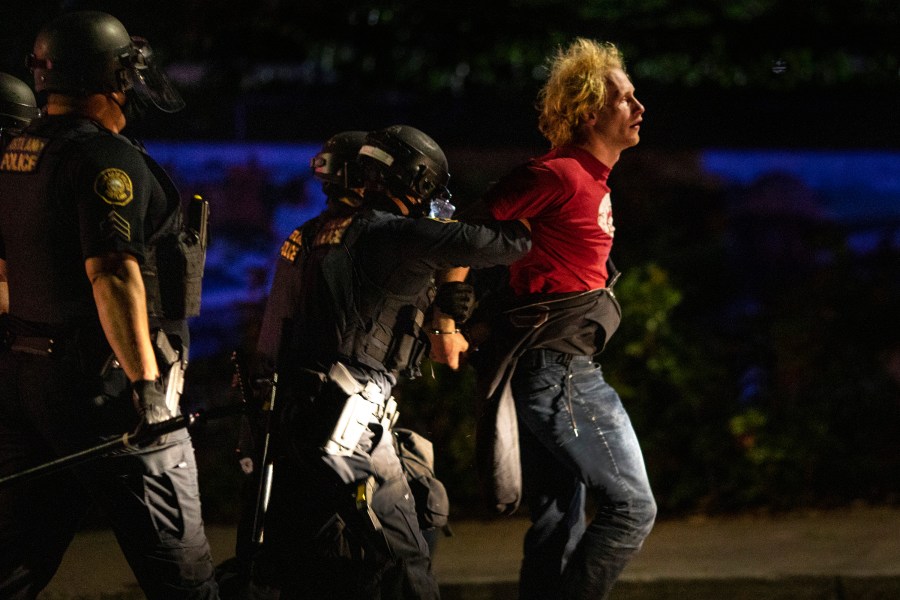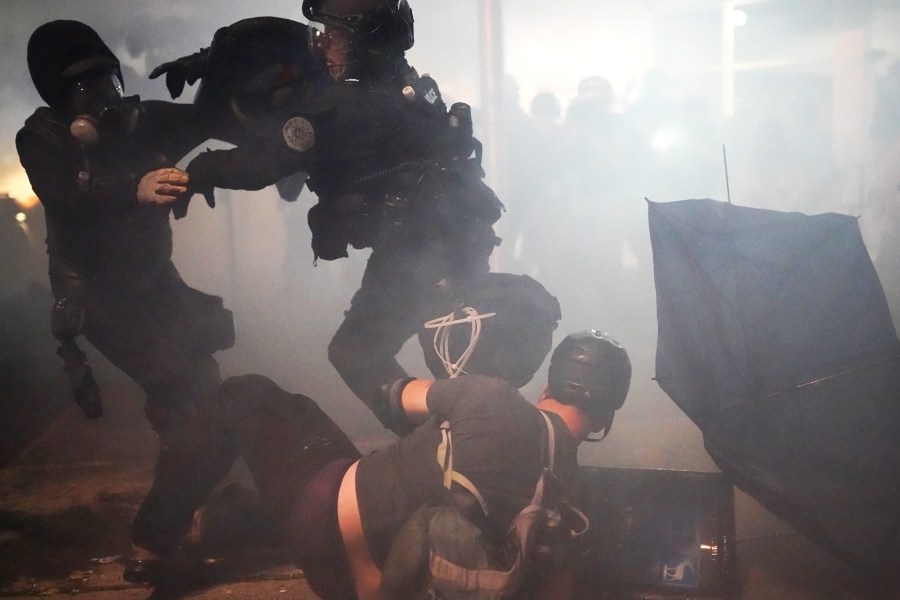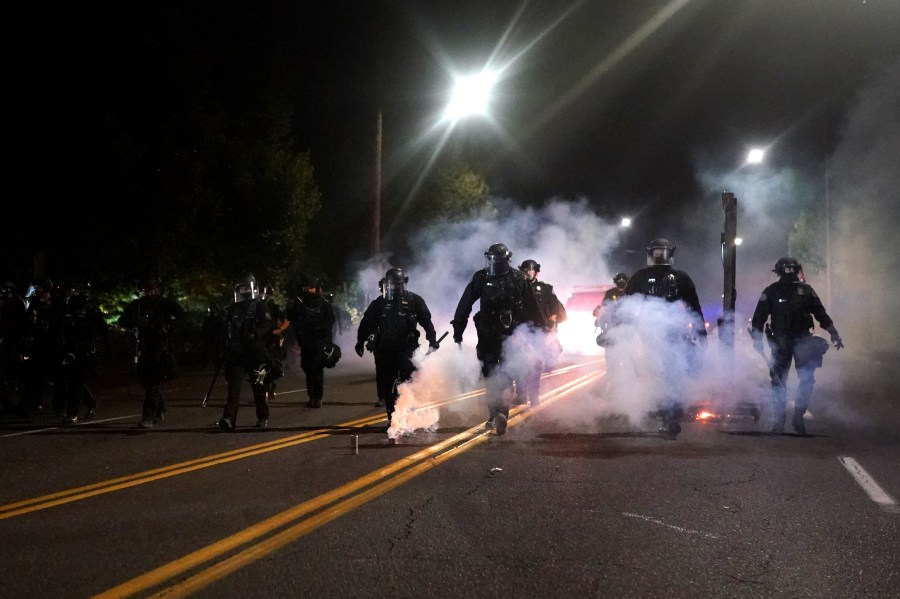PORTLAND, Ore. (KOIN) — After federal lawyers said during a public meeting the City of Portland failed to agree with providing a plan to reform Portland police’s use of force tactics, the City Attorney’s Office now says it will provide information to the Department of Justice about the city’s plan for reforms.
Federal lawyers asked Portland police to come up with a plan on the ways in which they will properly report, analyze and investigate officers’ use of force after DOJ found that key aspects of a 2014 settlement agreement on the city’s police reforms were not in substantial compliance.
Such a correction plan isn’t required by the settlement terms, federal lawyers said, but they need something to go off of in order to avoid bringing official notice of non-compliance to the city.
“That would be an unfortunate way to have to go about it,” said Assistant U.S. Attorney Jared Hager.
KOIN 6 News reached out to the Portland Office of the City Attorney to ask whether they would provide a remediation plan to get back in compliance with the settlement agreement, and they gave this response:
“The City is committed to its obligations under the settlement agreement with the U.S. Department of Justice, and the City will continue to cooperate with the Department of Justice to ensure compliance. The City is committed to working productively with the Department of Justice and intends to provide the Department information about the City’s plan to address their concerns.”
Jonas Geissler, a senior trial attorney with DOJ, said on Tuesday the city had systemic failures when it came to investigating force during protests last summer.
“Having failed the system for investigation of force at the front end, you starve the accountability system on the back end,” he said.
Geissler said federal officials are “eager” to see how the city will meet requirements of the settlement, including a roadmap of how the Portland Police Bureau would make the changes, backed up by evidence and data.
Geissler said absent such data, “I don’t know where we go yet from here. We’ll have to see.”
If no plan were to be provided, that may occasion a formal notice of non-compliance to the city by DOJ, an unprecedented step in the agreement’s seven year history that could bring both sides before a federal judge once again, The Oregonian/OregonLive reported Wednesday.

Last month, DOJ lawyers said Portland police no longer meet several key reforms required under a 2014 settlement agreement adopted after federal investigators found officers used excessive force against people with mental illness.
They cited inappropriate use and management of force last year during protests, inadequate training, subpar police oversight and a failure to adequately share an annual Police Bureau report with the public as required.
Police used force during mass protests in 2020 that violated bureau policy, with officers conflating active versus passive resistance as the basis for firing rubber bullets and other impact munitions considered to be less lethal, according to a DOJ review filed last month in federal court.
Supervisors frequently failed to probe or analyze officers’ use of force, gave blanket approval of force and often “cut-and-paste” identical or similar language into their reviews, the report said.
The issues were being discussed at a meeting with the Portland Committee on Community-Engaged Policing, a citizen-led oversight group tasked with reviewing whether police are adhering to the settlement’s terms.
Mary Claire Buckley, a city employee who oversees PPB’s Office of the Inspector General, said on Tuesday the city had never had to “write up” their plan in the past, as the DOJ gives an update to the city’s compliance annually. Buckley said the city can’t give a specific date or time to DOJ as to when PPB will get back on track, noting the city only received the recent federal report about six weeks ago.

Buckley said PPB is committed to having training that addresses the points that DOJ has raised on the content of police force reports, supervisors’ analyses and making sure the reviews are done on time.
Federal attorney Hager said the city had achieved substantial compliance with the settlement prior to summer 2020 protests, but that they now need to get back on track and maintain that compliance.
“Over the summer it was revealed to us and to the city, community and to the world really, that there is a systemic failure to implement some of the terms of the settlement agreement,” he said.
DOJ has more authority now to take action on the city’s lack of compliance than it did in the earlier years of the agreement, Hager said.
He said the problem is not simply one of a lapse of training, but that the large number of those uses of force done during protests occasioned an extremely high number of complaints for the city’s Independent Police Review to investigate.
“If the system can’t handle the amount of force that the city chooses to use in a crowd control situation, well then that’s a problem that we’re now confronted with,” Hager said.
PPB reports that its officers used force more than 6,000 times during crowd control events amid protests from May 29 to Nov. 15, according to DOJ’s February report.
While PPB supervisors are required to complete an after-action report that reviews each use of force within 72 hours, this rarely occurred, the report said.
Officers also rarely filled out a required data collection report by the end of their shift detailing when and why they used force and what the action was, according to the report.
The document also said officers targeted with force people who weren’t involved in any violence or sometimes due to the individual simply being slow to walk away after a dispersal order.
Buckley asked federal lawyers to bare in mind the context that led to the process breaking down.

“We were overwhelmed by the unprecedented protest activity,” she said. “And no other city in this country had 171 straight days of protest activity.”
While a typical month sees about 40 use-of-force reports in a month, there were 3,000 in June 2020, she said.
With only three police use of force analysts on staff, it was impossible for them to keep up with those numbers, Buckley said.
“It was not that the bureau didn’t have a system. It’s not that we deliberately didn’t do the work,” she said. “It was just that there was so much of it that we couldn’t keep up.”
Hager said PPB’s inability to track and review in a timely manner the instances of officers using force is a great concern, saying it is at the core of the settlement agreement.
If the city doesn’t comply with the provisions of the agreement, DOJ would provide a formal notice of non-compliance and allow for a response in 30 days, the federal lawyers said. If a resolution can’t be reached, mediation would follow.
The next court hearing on the settlement status is set for Aug. 26 before U.S. District Judge Michael H. Simon, who approved the original 2014 settlement agreement following a DOJ investigation that found Portland police engaged in excessive force against people with mental illness and fired unnecessary cycles of Taser gun shocks.
Below is the DOJ compliance report from February:
Associated Press contributed to this report.